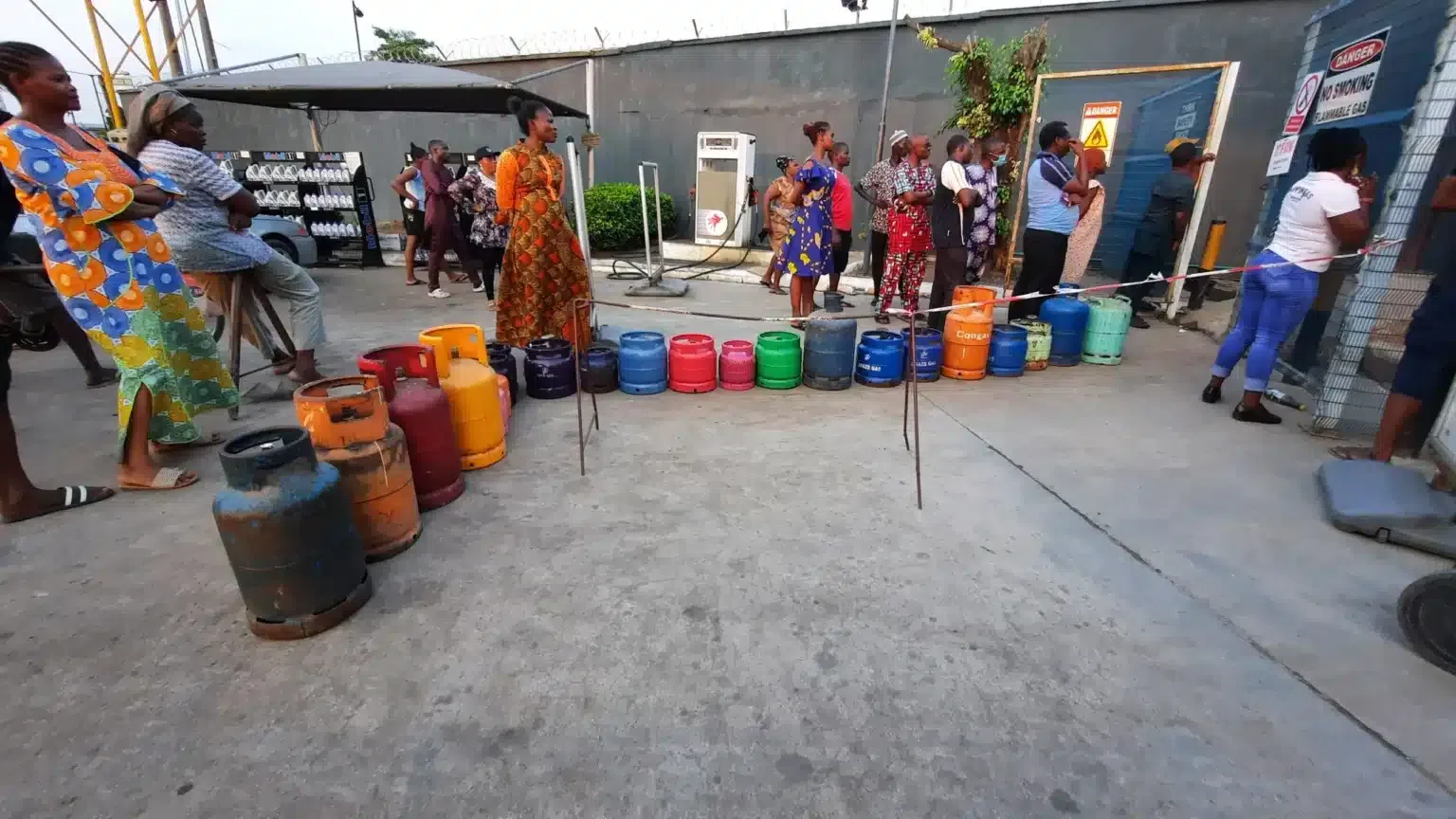
In recent days, Nigerians have been hit hard by a surge in the cost of Liquefied Petroleum Gas (LPG), also known as cooking gas. Across major cities like Lagos, Abuja, and Port Harcourt, prices have surged to between ₦2,500 and ₦3,600 per kilogram, meaning that refilling a 12.5kg cylinder now costs as much as ₦26,000.
The increase has given many households one more reason to be frustrated. Long queues are forming at filling stations and corner shops, and it’s not for fuel, it’s for cooking gas! Families are now turning to charcoal, kerosene, or even firewood as alternatives.
So, what exactly is driving this sudden surge in gas prices and scarcity?
ALSO READ: 5 Ways to Stop That Dangerous Gas Leak Early
Why Cooking Gas Is Scarce and Expensive in Nigeria Right Now
1. The PENGASSAN Strike Disrupted Supply Chains
The biggest trigger for the spike was the recent industrial action by the Petroleum and Natural Gas Senior Staff Association of Nigeria (PENGASSAN). The strike, which began over the dismissal of Nigerian workers at the Dangote Refinery, halted loading and distribution of LPG across the country for several days.
This created a bottleneck in supply lines, causing an “artificial scarcity,” according to NNPC’s Group CEO, Bayo Ojulari. Even after the strike was suspended on October 1 following government intervention, it takes time for supply and distribution to fully normalise, resulting in the temporary price surge seen nationwide. Ojulari explained:
The increase you saw was relatively artificial because, for the period of the strike, movements and loading were delayed by about two to three days. As things normalise, it takes a while for distribution to catch up again.
RELATED: PENGASSAN condemned for claiming Dangote Refinery sacked 800 Nigerians
2. Opportunistic Retailers Exploited the Crisis
While the supply disruption played a part, market opportunism worsened the situation. Some retailers and middlemen reportedly hiked prices deliberately to profit from public panic. Ojulari criticised this behaviour, saying many dealers with existing reserves increased prices during the shortfall rather than selling at standard rates. He said:
As you know, in Nigeria, people take the opportunity. With that delay, some of the people who had existing reserves decided to increase prices.
YOU MIGHT LIKE: Here Are 7 Ways to Make Your Cooking Gas Last Longer
3. Local Refinery Maintenance and Distribution Delays
Industry insiders, including the Nigerian Association of Liquefied Petroleum Gas Marketers (NALPGAM), confirmed that internal maintenance activities at the Dangote Refinery also contributed to the temporary disruption.
Vessel berthing delays at Lagos terminals slowed offloading and distribution, although other regions like Port Harcourt were less affected due to steady supply from the Nigeria LNG Limited (NLNG). These logistical hiccups added pressure to an already strained system, particularly in the Southwest, where demand is highest.
EXPLORE: Can Your Phone Cause a Gas Explosion in the Kitchen? Here’s the Truth
4. Poor Supply Chain Resilience
Experts point out that Nigeria’s domestic gas supply network remains fragile, making it vulnerable to shocks such as strikes, maintenance shutdowns, or weather disruptions. Although local production has improved, the country’s distribution infrastructure and storage capacity are still inadequate.
Dr. Ayodele Oni, an energy law expert, noted that despite higher upstream gas output, Nigeria continues to face recurring shortages and sudden price surges, and these are symptoms of systemic weakness in the gas market structure.
SEE THIS: Is your gas cooker flame green? It could be a warning sign
5. Panic Buying and Limited Alternatives
As prices climbed, panic buying set in. Many households rushed to refill their cylinders in fear of further increases, putting additional pressure on limited supplies. In major cities, long queues at gas plants became common, while smaller retailers sold at inflated prices.
This scarcity has forced some Nigerians to revert to unsafe cooking alternatives like charcoal and firewood, which are harmful to their health.
RECENT: List of top Nigerian Politicians involved in Certificate Forgery Allegations
What Are the Alternatives To Cooking Gas?
With cooking gas prices at record highs, households are seeking temporary alternatives, and below are a few options:
-
Electric cookers and induction stoves (where the power supply is reliable)
-
Kerosene stoves, though less efficient and with safety risks
-
Biogas or solar-powered cookers, where available
-
Charcoal and firewood, though these should be used cautiously due to health and environmental concerns
Despite the current hardship, the situation is expected to stabilise soon. NNPC’s Bayo Ojulari has assured Nigerians that the spike is temporary and prices will ease in the coming weeks as distribution normalises and loading resumes fully.
Now that things have normalised, prices should return to what they were before the strike.
With the strike over and refineries resuming normal operations, consumers can expect to see a gradual drop in prices, hopefully returning to the usual price of ₦1,200 per kg.
ALSO READ: How to Get Your Tax Identification Number (TIN) Online
